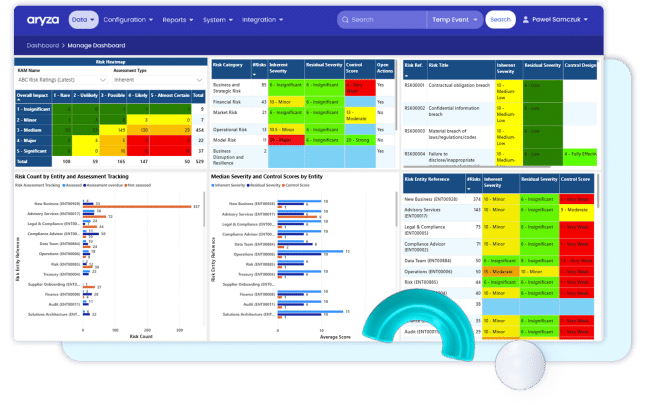Enterprise Risk Management: Turn Risk Data into Actionable Insight
Enterprise risk data is only valuable when it’s accessible, integrated, and actionable. By combining automated data collection with powerful analytics, organisations gain the clarity they need to manage risk proactively and make confident decisions.

Make good decisions with GRC Intelligence
Managing enterprise risk well within financial services organisations isn’t just about collecting data – it is also about analysing that data and sharing insights across the business. Aryza Unite – Enterprise Risk Management enables firms around the globe to create true GRC Intelligence from enterprise risk management data – it is a solution that takes an integrated approach to data capture, analytics, and reporting.
Automate KPI Collection
Understand which services, systems, and suppliers are essential — and how they connect across your organisation.
Close Risk-Related Issues
Manage incidents and issues – Ensure actions to remediate issues are carried out through a range of tools. Have one go-to source for reporting to the board, regulators, and other stakeholders.
Connect Risk and Resilience
View enterprise risk and resilience together – Analyse how risk management and operational resilience impact the organisation in an integrated way.
Monitor Limits Proactively
Automate monitoring of limits – Set target levels for limits, as well as alerts and workflows should limits be breached.
Unify ERM Data
Create a single source of ERM data – Bring together qualitative and quantitative information within a secure, unified platform.
Link Risk Appetite to Action
Link risk appetite to what happens – Connect qualitative statements and quantitative metrics back to the risk appetite, so the business understands if it is operating within its limits.
Unlock GRC Intelligence
Create GRC Intelligence with BI Reporting – See who is approaching their limits. Understand who is most exposed from an ERM perspective. Explore hundreds out-of-the-box report templates or create a new one.
Working with ERM data
Gathering and analysing enterprise risk management data – both quantitative and qualitative information – can sometimes seem like an overwhelming task. Aryza Unite – Enterprise Risk Management helps firms automate data collection. For example, workflow tools speed collection of qualitative information, while APIs process KPI metrics. Data about all risks, including liquidity risk, credit risk, profitability risk and reputational risk, can be analysed quickly and easily.

Case: Leading UK Based Investment Manager
Case: Leading Global Financial Services Firm
Case: Major Global Banking Institution
A leading UK based Investment Manager with over £22Bn in funds under management implemented Aryza Unite and migrated from another GRC supplier. The migration was carried out seamlessly with minimal to zero disruption.
The firm is using the Aryza Unite widely within the organisation and utilise the functionality for a large number of GRC activities.
These include:
- Reporting and escalation of dealing errors using the Incident Management functionality
- Compliance Monitoring
- Compliance Thematic Reviews
- Compliance Breaches
- Internal Audit Reporting
- Regulatory Horizon Scanning
- Policy Exception
- Product and Service Reviews
- Third Party SLA Breaches
- Data Breach Analysis and Escalation
- Risk and Control Testing
This deployment demonstrates the wide potential of Aryza Unite to provide significant value across a wide spectrum of GRC activities and showcases the deep functionality and flexibility inherent in the system.
Despite the challenges of a rapidly changing regulatory environment, a leading global financial services firm has successfully implemented Aryza Unite, migrating from their legacy GRC system.
The firm identified a clear opportunity to enhance their GRC processes to meet more stringent regulatory requirements while improving operational efficiency. The Aryza system and team were chosen as they wanted to implement a market-leading and dynamic platform supporting a diverse range of GRC activities including incident management, risk and control assessments, key risk indicators, compliance and policy management.
The system needed to deliver more efficient risk management with effective and consistent risk assessment and reporting capabilities to support the firm’s operations across multiple jurisdictions. Utilizing its experienced team of GRC experts, coupled with its unique mix of modern, adaptable software, Aryza delivered a phased approach to implementing an enterprise-wide solution that automated processes, eliminated silos, and improved ease of use and efficiency.
The platform has led to significant improvements in incident management, risk assessment quality, and reporting capabilities, enabling the firm to respond more effectively to regulatory requirements
A major global banking institution with operations in over 30 countries implemented Aryza Unite to standardize their risk management approach across all regions. The company needed a solution that could accommodate varying regulatory requirements while providing consolidated group-level reporting.
The initial scope of the project was to implement the Risk and Control Assessment (RACA) module to create consistency in how operational risks were assessed across the organization. We delivered a configurable RACA process that allowed for local customization while maintaining group-wide standards. The system’s flexibility enabled the company to apply different risk assessment matrices for different business units while rolling up to consistent group reporting.
Following the successful implementation of the RACA module, the company expanded the implementation to include incident management, key risk indicators, and action tracking. The integrated nature of our solution allowed for automatic linkage between incidents, risks, and controls, providing a comprehensive view of the risk landscape.
The incident management functionality was particularly impactful as the wide and diverse nature of the group meant that reporting of incidents was unstructured and difficult to quantify and track.
The implemented system was transformational and enabled a centralised view of incidents, with rapid response times and features such as root cause analysis and automated action plans
Contact us
"*" indicates required fields



